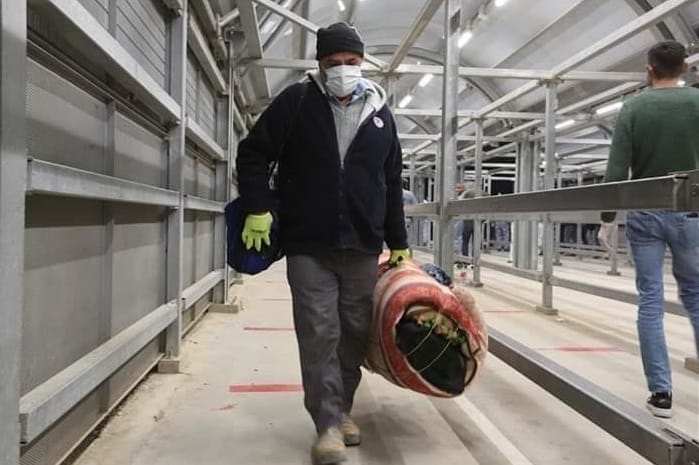A new Kav LaOved report reveals continued systemic violations of Palestinian workers’ rights: 34% of Palestinian construction workers still have to pay for Israeli permits; 84.7% have asked their employer for sick pay but only 7.8% have received it; 74.6% were not informed that they should have a pension fund; most workers do not receive a pay slip on a regular basis as required by law; and authorities do not enforce workers’ rights.
More than 80,000 Palestinian workers from the Occupied Palestinian Territories (OPT) work in Israel with permits, 60,000 of them in the construction industry. A new report by Kav LaOved – “Situation Report – Developments and Reform in the Employment Conditions of Palestinians in Israel“ reviews the history of their employment in Israel, the payment of illegal brokerage fees to obtain work permits, and the systemic denial of rights such as pension and sick pay they suffer.
Kav LaOved’s long-standing legal battle began to bear fruit in December 2020 when the work permit reform for Palestinian construction workers went into effect. The reform was aimed at ending both the binding of workers to their employer and the widespread and illegal trade in work permits. In parallel, developments seemed also to be taking place in relation to pension and sick pay, both legally mandated, but not paid to Palestinian workers in practice. Despite these developments, the latest report – which includes qualitative and quantitative surveys of workers – shows that the trade in permits continues as does the systemic violation of workers’ rights in all areas.
Volume of trade in work permits – According to a Bank of Israel study covering 2018-2019, 30% of Palestinian workers in Israel bought their permits, generating more than NIS 1 billion in brokerage fees. A survey of 215 construction workers carried out by Kav LaOved in March 2021 (three months after the reform went into effect) indicates that 34.9% of them are still paying for a permit. In addition, 76.3% of the workers who responded to KLO’s survey paid between 1501 and 2500 NIS for the permit.
Pension insurance – According to the survey, out of 216 respondents working in constructions, 74.6% reported that they were not told they should be insured through a pension fund. Moreover, 96.7% said they did not know that withdrawing pension money now means they, or their families, will not receive a fixed monthly benefit in case of serious illness, old age or death. Among workers in sectors other than construction, 94.9% of 77 respondents reported not being informed that they should be insured through a pension fund.
Sick pay – out of 111 respondents in the construction sector, 84.7% stated that they asked their employer for sick pay, but only 7.8% received it while 92.2% did not. In sectors other than construction, 75.9% of 78 respondents requested payment for sick day but only 5.3% reported that they actually received it.
Pay slips – pay slips allow workers to know what social rights were paid to them. In spite of being obligatory, most Palestinian workers do not receive them. Out of 215 respondents in the construction sector only 12.6% reported that they regularly receive a pay slip. Out of 78 respondents in other sectors, only 28.2% regularly receive pay slips. When asked if the amount that appears on the slip matches the salary, 94.8% of the 211 respondent in the construction sector answered that it does not.
Enforcement of workers’ rights – despite this dismal situation, enforcement by the authorities of the rights of the 80,000 Palestinian workers in Israel is very poor. In 2018, the Population and Immigration Authority conducted only 37 enforcement actions and in 2019 only 41.
Attached is the full report.
 Loading...
Loading...
If you don’t see the full report click here


